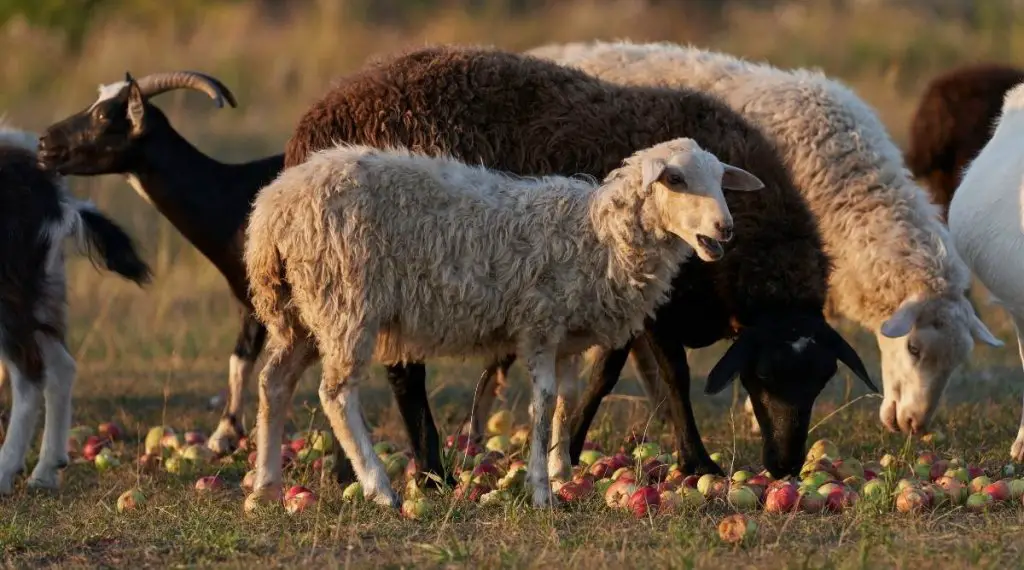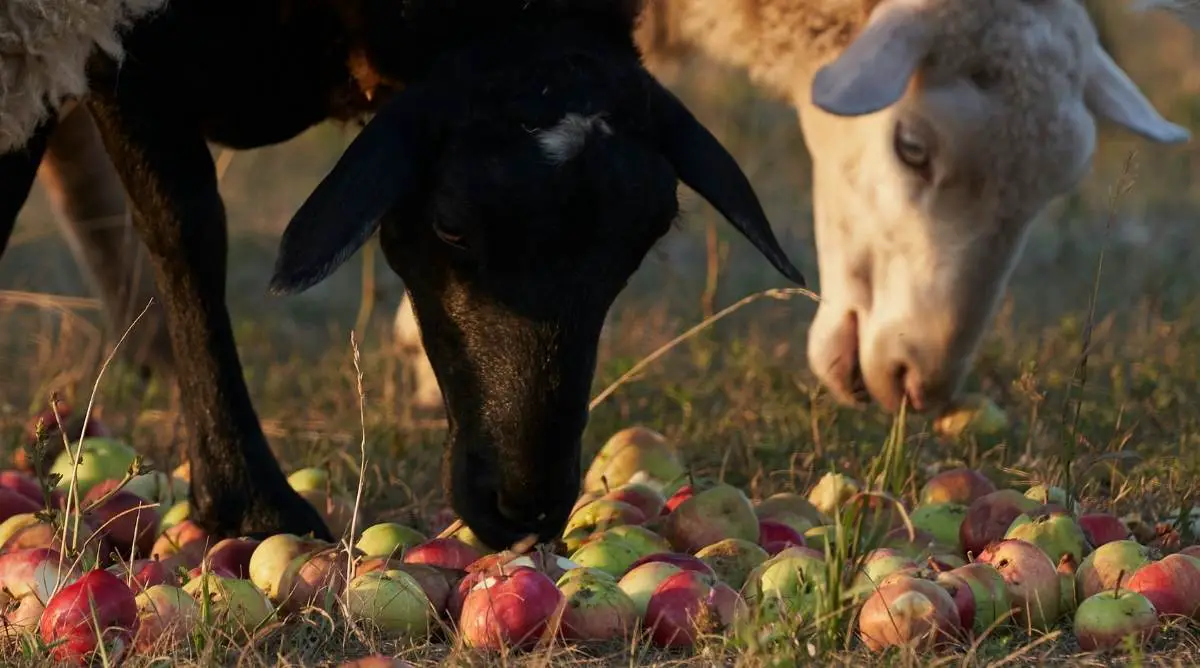Yes, sheep can eat apples—in small pieces and in moderate amounts. Sheep are ruminants, which means they can graze and eat different plants, including fruits. However, apples are not a primary food source for sheep, so you should not give them too much.
Table of Contents
Are apples good for sheep?
Apples are a good source of vitamins, minerals, and fiber. Feeding apples to sheep will keep them healthy, and help improve their digestion and bowel movements.
Health benefits of feeding apples to sheep
Apples, especially the skins, are rich in fiber. They are also rich in potassium, vitamins A and C, and magnesium.
- Fiber or roughage is important for good gut health. Roughage helps prevent constipation by keeping bowel movements regular.
- Potassium is a mineral that aids in bacterial fermentation in the rumen, or the sheep’s first stomach. This is where swallowed food is first stored and fermented before it is regurgitated, chewed, and swallowed again.
- Vitamin A helps maintain night vision and improves fertility and growth in sheep.
- Vitamin C is a powerful immunity booster. It helps prevent diseases and fights the effects of heat stress.
- Magnesium helps maintain enzyme, nervous system, muscle, and skeletal functions. In ewes, magnesium is essential for lambing and milk production.
Do sheep like apples?
Sheep cannot normally eat apples when they graze on the ground, so they might not be familiar with the taste.
However, apples are juicy and sweet, so they are not unpalatable to sheep. You can try giving sheep small pieces at first. Mix bits of apple with their normal feed.
How to prepare apples for sheep
When preparing apples for sheep, keep the following steps in mind:
- Wash and core: Fresh apples should be washed, cored, then cut into small pieces.
- Cut into small pieces: Make sure the slices or cubes are small enough for the sheep to chew.
- Keep the skin and remove seeds: It is better to keep the apple skin, but make sure there are no seeds.
You can also feed apple pomace to sheep. Apple pomace is the solid leftover from processing apple juice, puree, or cider. It is a mixture of apple flesh, core, peel, seed, and bits of stem.
Apple pomace can be used as livestock feed. It is a great alternative to maize silage, which is the most common feed for sheep and other livestock.
Risks when feeding apples to sheep
A few risks to keep in mind:
- Prevent choking: Apples that are given whole or cut up too big can cause choking. Make sure the pieces are small or the slices are thin enough so the sheep can chew and swallow them without causing harm.
- Avoid high quantities of seeds: The seeds can also be poisonous to sheep (in large quantities). Apple seeds contain traces of cyanide, and eating large quantities can be toxic.
- Maintain a balanced diet: Apples should be regarded as occasional treats, like plums, alfalfa, and legumes. They should not replace livestock feed or grazing in pastures.
Feed apples to sheep in moderation

Pastured sheep should be allowed to graze first before being given apples. This is so feeding apples will not disrupt the sheep’s normal grazing patterns.
Too many apples can cause bloating and diarrhea in sheep. The acidity in apples can trap gastrointestinal gasses, which can be painful. If you want to add apples to your sheep’s diet, make sure that apples are only 20% or less of the sheep’s food.
Other fruits sheep can eat
Feeding a variety of fruits and vegetables to sheep is the key to achieving balanced nutrition.
Aside from apples, sheep can eat the following fruits:
- Bananas. Bananas are also rich in potassium and fiber. You can even feed banana peels to your sheep — they aid in digestion.
- Grapes. Sheep love eating grape leaves, and New Zealand grape farmers bring sheep to help prune their vineyards. Grapes are packed with vitamin K, which is important in keeping sheep bones healthy.
- Watermelons. Watermelons are 90% water, which can help keep sheep hydrated during hot summer days. You can feed your sheep watermelon flesh and even the leftover rinds. Make sure to take out the seeds, though.
- Ripe oranges. Oranges are rich in vitamin C, and can be a juicy treat for sheep. Citrus silage can even improve milk quality in lactating ewes.
- Pears. Pears contain fiber, potassium, vitamin K, vitamin C, and protein.
- Stone fruits. Apricots and peaches can also be given to sheep sparingly. Make sure that the pits are removed before feeding to you sheep.
Like apples, these fruits should be given only in small to moderate amounts.
Fruits sheep should not eat
While sheep can eat a variety of plants and fruits, there are some fruits that they should not eat. These include:
- Avocados. Every part of the avocado plant, from the leaves, to the pits of the fruit, are toxic to livestock like sheep. Avocado plants contain persin, which is poisonous to sheep.
- Unripe oranges. Unripe oranges contain solanine, which can cause an upset stomach. Oranges and other citrus fruits can also cause an upset stomach if given in large amounts.
- Tomatoes. Tomatoes are toxic to sheep. Like unripe oranges, tomatoes and other members of the nightshade family contain solanine.

